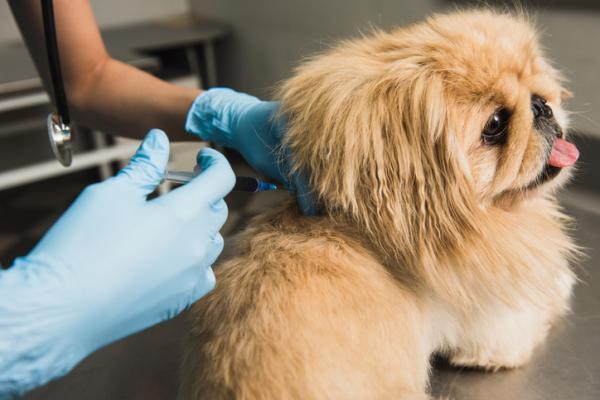Is Vaccinating Pregnant Dogs Safe?



See files for Dogs
There are many concerns a guardian will have for their pregnant dog. Maintaining the health and well-being of the mother is the best way to ensure the same for her puppies. Some female dogs reach sexual maturity after only 6 months of age. This could mean that a dog gets pregnant unexpectedly. Even if we plan on a dog's pregnancy, we may not have all the measures in place to best safeguard their health. Vaccinations are one of the most important such safeguards.
Since a vaccination involves introducing a small part of a disease to activate the body's immune system, many wonder is vaccinating pregnant dogs safe? AnimalWised explains why it is best to wait until the pregnancy comes to term before vaccinating your dog and when exceptions should be made.
Why vaccinate a dog?
In order to explain the safety issues concerning vaccinating pregnant dogs, we need to be clear on their purpose. Vaccination is a veterinary procedure which consists of administering a small amount of a pathogen to allow their immune system to react. In doing so, their body is able to defend against disease when they are next exposed to a given pathogen. If they will either not be affected at all or only suffer mild symptoms.
We cannot vaccinate a dog against every possible disease. Some vaccinations have not been developed and others are not worth developing due to their relative infrequency of infection. The diseases for which dogs are vaccinated are those which are usually the most common and infections in a given region. Not all countries will have the same vaccination protocols for animals.
While the vaccination is given to combat a specific disease, there is some evidence to suggest that vaccinations can boost the dog's overall health. This evidence can be seen from studies done on the rabies vaccine for dogs, although further research is required[1].
There is some controversy over vaccinations in general. This is due to a small possibility of adverse reaction in a dog. However, these adverse reactions are statistically very rare and often only result in temporary side effects. If a problem does arise, it will usually manifest within the 72 period after their administration[2].
When we adopt a dog into our family, we take on their responsibility of care. One of the first things we need to do is take the dog to a veterinarian for a checkup. They will either administer necessary vaccinations or arrange for when this is suitable. A dog will require their first vaccination as early as 6-8 weeks of life. According to the American Veterinary Medical Association, the following diseases can be avoided through vaccination:
- Rabies
- Canine parvovirus infection
- Canine distemper
- Leptospirosis
- Canine adenovirus-2
- Canine parainfluenza
- Canine enteric coronavirus
- Canine influenza
- Lyme disease
- Bordetellosis (also known as ‘kennel cough’)
- Heartworm disease
- Intestinal worms
Vaccinations are usually administered via injection. This is given to the dog as a shot under the skin at the back of their neck. However, there has been some research which shows that orally administered vaccinations can also be effective[3].
What happens if a pregnant dog is vaccinated?
The canine gestation period lasts an average of about 63 days. During this time, the dog's human guardian has a responsibility of care. These should be specified during the veterinary confirmation once we see the signs a dog is pregnant. They will be able to advise on providing a stress free environment and offering the best diet to ensure the health of mother and puppies. You can find out more specifics in our article on what to feed a pregnant dog.
On whether a pregnant dog should be vaccinated, we need to understand that gestation of her puppies is a particularly sensitive time for a dog. Many medicines and even certain foods should be avoided. We should never administer any pharmaceutical drug or even antiparasitic medication unless explicitly told to by a veterinarian. To know more, look at our article on deworming a pregnant dog.
The reason for this is because some substances introduced into the dog's bloodstream manage to cross the placental barrier. This means they will enter the fetuses in the mother's uterus. While the the mother will be developed enough to withstand negative effects of the drug, the fetuses will be too vulnerable. The result may be miscarriages, developmental disorders or physical malformation.
Although rare, vaccines may trigger mild fever or even allergic reactions. Although the mother should recover, pregnancy is not a good time to risk any health issue.

Should a pregnant dog be vaccinated?
Based on the data present above, generally a pregnant dog should not be vaccinated. This is a generalization because every pregnant dog must be assessed on their individual circumstances. Ideally, a dog should be fully dewormed and vaccinated before becoming pregnant. However, this is not always possible. For example, this may happen when a dog is rescued from the street.
If the veterinarian believes the dog is at significant risk of contracting a disease, they can decide if they need a vaccination. This will be best of measuring the benefits against the risks. Even in these cases, however, they will not use vaccinations which contain live viruses. The reason is because they are more likely to cross the placental barrier. Before they administer this vaccination, they will likely internally deworm them.
Around 7 to 10 days after a vaccination is administered the dog's immune system reaction will take place. At about 2 weeks post-administration, the maximum antibody level will be reached. Additionally, if vaccinated in time, the puppies should also be protected after birth. This is because they will likely be present in the colostrum milk given to the puppies during their first feeding.

Can I vaccinate a pregnant dog against rabies?
We have already seen that pregnant dogs should not be vaccinated under normal conditions. It is better to do it before fertilization when mating with a male or after the puppies have been weaned. If the dog has been well vaccinated, but is due to have a booster shot, this should be postponed also.
There are many different diseases which require vaccination, but there is particular doubt over the rabies vaccine. Rabies in dogs is a deadly zoonotic disease, i.e. it can be transferred to humans. For this reason, administering rabies vaccinations may be a legal requirement in some countries or regions. The reason is not only to protect the animal, but for public health. In some countries, failure to vaccinate a dog, regardless of pregnancy, is considered an offense and may incur a financial penalty.
For this reason, a veterinarian may require a rabies booster shot, even if she is pregnant. While we generally should not vaccinate a pregnant dog, there is a rabies vaccine for dogs which is considered suitable for pregnant bitches. As always, the decision to administer is up to the veterinarian.
If you have any other doubts about canine vaccination, you can take a look at our article on when you can bathe a dog after vaccination.

This article is purely informative. AnimalWised does not have the authority to prescribe any veterinary treatment or create a diagnosis. We invite you to take your pet to the veterinarian if they are suffering from any condition or pain.
If you want to read similar articles to Is Vaccinating Pregnant Dogs Safe?, we recommend you visit our Vaccination category.
1. Knobel, D. L., Et al. (2017). Rabies Vaccine Is Associated With Decreased All-Cause Mortality in Dogs. Vaccine, 35(31), 3844-3849.
https://pubmed.ncbi.nlm.nih.gov/28602607/
2. Moore, G. E., et al. (2005). Adverse Events Diagnosed Within Three Days of Vaccine Administration in Dogs. Journal of the American Veterinary Medical Association, 227(7), 1102-1108.
https://pubmed.ncbi.nlm.nih.gov/16220670/
3. Cliquet, F., et al. (2018). Oral vaccination of dogs: a well-studied and undervalued tool for achieving human and dog rabies elimination. Veterinary Research, 49(61).
https://veterinaryresearch.biomedcentral.com/articles/10.1186/s13567-018-0554-6
- Carlson, D. G., & Giffin, J. M. (2002). Practical Canine Veterinary Manual. Madrid: El Drac.
- Fariñas, F. (2015). Vaccine failures dependent on the animal. Myths and Realities. Veterinary Portal.
- Manresa, I. (2015). Management of the pregnant female. Ateuves Magazine, 43, 30-35.
- AVMA. (n.d.). 12 Dog Diseases You Can Combat with Vaccination and Deworming.







